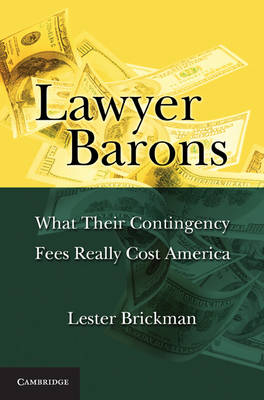
Lawyer Barons
Cambridge University Press (Verlag)
978-0-521-18949-1 (ISBN)
This book is a broad and deep inquiry into how contingency fees distort our civil justice system, influence our political system and endanger democratic governance. Contingency fees are the way personal injury lawyers finance access to the courts for those wrongfully injured. Although the public senses that lawyers manipulate the justice system to serve their own ends, few are aware of the high costs that come with contingency fees. This book sets out to change that, providing a window into the seamy underworld of contingency fees that the bar and the courts not only tolerate but even protect and nurture. Contrary to a broad academic consensus, the book argues that the financial incentives for lawyers to litigate are so inordinately high that they perversely impact our civil justice system and impose other unconscionable costs. It thus presents the intellectual architecture that underpins all tort reform efforts.
Lester Brickman is a Professor of Law and former Acting Dean at the Benjamin N. Cardozo School of Law at Yeshiva University, where he teaches contracts and legal ethics. He has written extensively on legal ethics and his writings have been widely cited in treatises, casebooks, scholarly journals and judicial opinions. Brickman is a leading authority on contingency fees and his writings on that subject are the basis for a proposal to realign the contingency fee system with its policy roots and ethical mandates.
1. The origin of the contingency fee; 2. How profitable are contingency fees?; 3. Are contingency fee profits 'reasonable'?; 4. How tort lawyers have increased their profits by restraining competition; 5. Why the market has failed to correct the absence of price competition; 6. Impediments imposed by the bar to price competition; 7. The effects of incentives created by contingency fees; 8. How the quest for profits influenced the development of the tort system; 9. Lawyers' role in the expansion of tort liability; 10. The role of the judiciary in tort system expansion; 11. Current and future expansions of tort liability; 12. The litigation explosion: 'fact or fiction'?; 13. Measures of the rate of expansion of tort liability; 14. The relationship between injury rates and tort system costs; 15. The impacts of substantial increases in tort lawyers' effective hourly rates; 16. Class actions; 17. Fees in class actions; 18. How class action lawyers game fee setting; 19. Securities class actions; 20. Regulation through litigation; 21. A new role for punitive damages: policy-making as a profit center; 22. For-profit partnerships between state attorneys general and contingency fee lawyers; Appendix A. A critique of Alex Tabarrok, the problem of contingent fees for waiters; Appendix B. Calculating tort lawyers' effective hourly rates in 1960; Appendix C. Electronic discovery and the use of contract lawyers; Appendix D. The HMO litigation; Appendix E. The GM 'side saddle' truck litigation: the (short lived) triumph of litigation over the regulatory process; Appendix F. Modern class actions undermine democratic precepts; Appendix G. Other ways lawyers game class action fees; Appendix H. Non-recourse financing of tort litigation; Appendix I. Political contributions by tort lawyers and the U.S. chamber of commerce; Appendix J. Special rules favoring lawyers; Appendix K. The ultimate medical expense 'build-up': whiplash; Appendix L. The effect of punitive damages on compensatory awards.
| Zusatzinfo | 1 Tables, unspecified |
|---|---|
| Verlagsort | Cambridge |
| Sprache | englisch |
| Maße | 153 x 230 mm |
| Gewicht | 770 g |
| Themenwelt | Geschichte ► Teilgebiete der Geschichte ► Militärgeschichte |
| Recht / Steuern ► Allgemeines / Lexika | |
| Recht / Steuern ► EU / Internationales Recht | |
| Recht / Steuern ► Privatrecht / Bürgerliches Recht ► Besonderes Schuldrecht | |
| Recht / Steuern ► Rechtsgeschichte | |
| ISBN-10 | 0-521-18949-7 / 0521189497 |
| ISBN-13 | 978-0-521-18949-1 / 9780521189491 |
| Zustand | Neuware |
| Haben Sie eine Frage zum Produkt? |
aus dem Bereich


